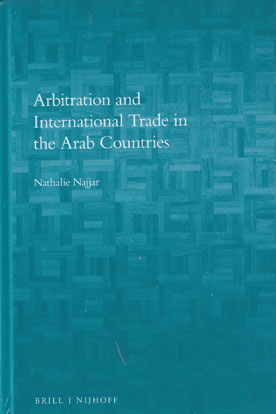
Arbitration and International Trade in the Arab Countries by Nathalie Najjar is masterful compendium of arbitration law in the Arab countries.
A true study of comparative law in the purest sense of the term, the work puts into perspective the solutions retained in the various laws concerned and highlights both their convergences and divergences. Focusing on the laws of sixteen States, the author examines international trade arbitration in the MENA region and assesses the value of these solutions in a way that seeks to guide a practice which remains extraordinarily heterogeneous.
The book provides an analysis of a large number of legal sources, court decisions as well as a presentation of the attitude of the courts towards arbitration in the States studied. Traditional and modern sources of international arbitration are examined through the prism of the two requirements of international trade, freedom and safety, the same prism through which the whole law of arbitration is studied.
The book thus constitutes an indispensable guide to any arbitration specialist called to work with the Arab countries, both as a practitioner and as a theoretician.